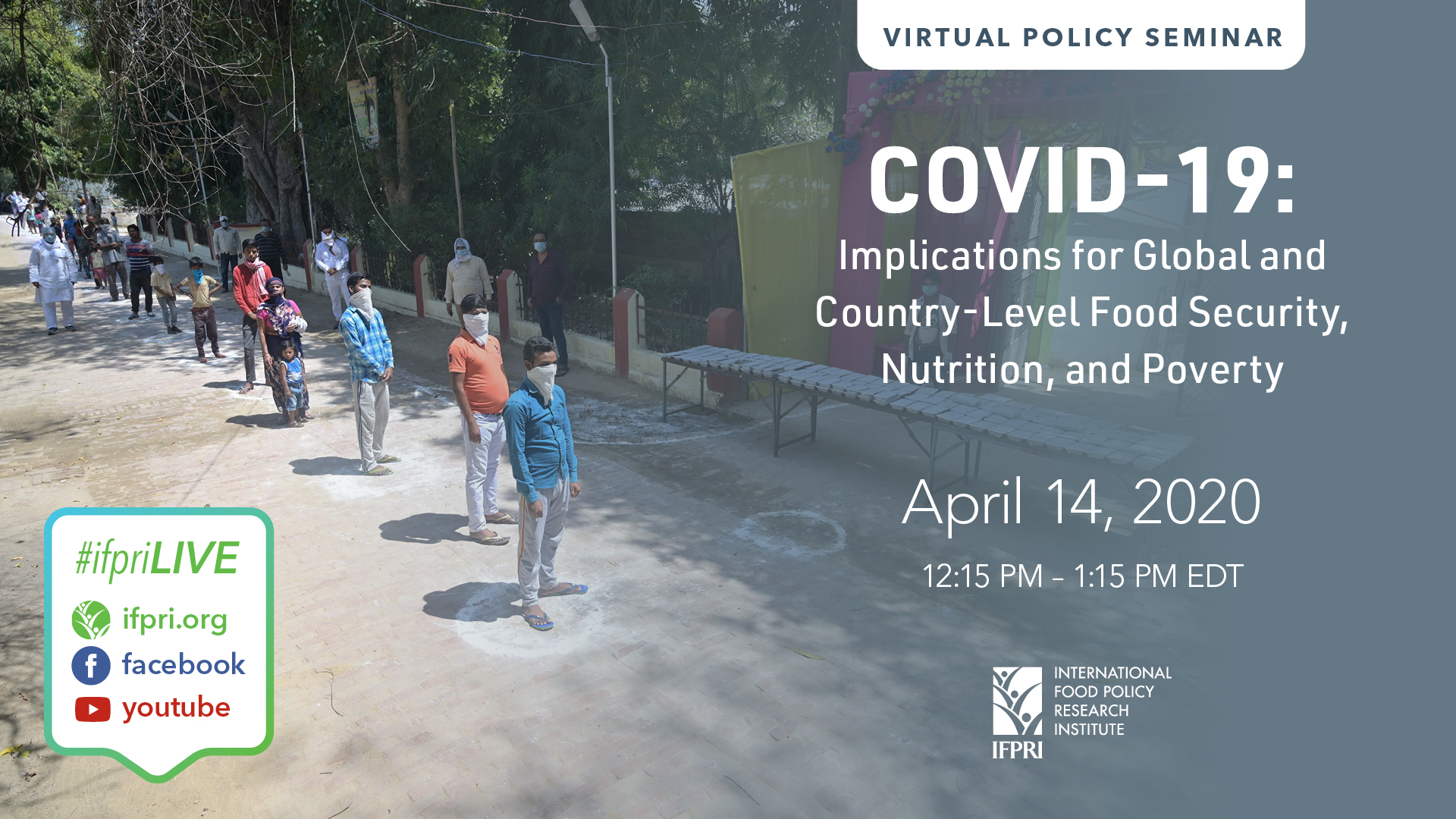As the world continues to grapple with the COVID-19 pandemic, disruptions in economies, food systems, and public health are falling heavily on the global poor. IFPRI researchers explored these complex global and country-level implications at an April 14 online seminar.
“COVID-19 will have significant impacts on global food security, on nutrition, and on poverty. The impacts are going to be heterogeneous–different impacts for different food systems and for people in different environments,” said IFPRI Director General Johan Swinnen in opening the event.
COVID-19, Swinnen explained, will disproportionately impact the poor because widespread business shutdowns prohibit so many from using their single largest economic asset—manual labor. Most do not have other assets such as land or capital to fall back on. In addition, governments of poorer countries are less able to provide support to make up for lost incomes, and social protection programs, which contribute to overall health and nutrition, are disrupted, he noted.
“Today, we are in a global recession, and we are all losers but … we are not equal in front of these losses,” said IFPRI Senior Research Fellow David Laborde. A recent modeling scenario of a 5% loss in global economic growth compared to expectations showed that extreme poverty could increase by up to 20%, he noted—a striking amount. Africa south of the Sahara and South Asia could both see significant increases of poor and extremely poor people.
The result demonstrates the ongoing problem of inequality within and across countries, he said. Affected countries face significant challenges, he said: They will have to figure out how to address these inequalities in coming years, while also managing the public debt generated responding to the pandemic on top of preexisting debt problems.
“Interventions are largely shaped by the powerful rather than the interests of the poor, who tend to suffer disproportionately,” said John McDermott, director of the CGIAR Research Program on Agriculture for Nutrition and Health (A4NH).
With high population densities and shared living spaces, the poor face problems following physical distancing guidelines—keeping six feet away from others to minimize the spread of the coronavirus, McDermott said. Many poor people also lack access to soap and clean water, making frequent handwashing—another key health recommendation—less effective. In addition, health systems for poor people in much of the developing world lack resources; in Africa, there is only one doctor for every 4,000 people.
Researchers shared recent findings from China and India and their implications for food security, poverty, and nutrition.
In China, “COVID-19 has landed a fatal blow to SMEs [small and medium-sized enterprises], which generate huge employment,” said IFPRI Senior Research Fellow Xiaobo Zhang. Though COVID-19 is temporarily under control in China, he said, SMEs face headwinds because of disruptions in global supply chains and decreased internal demand. China’s SMEs accounted for 30% of global GDP growth in 2019 and shutting them down for one month resulted in $600 billion in losses. Agricultural businesses were also significantly impacted, he said, with feed suppliers unable to deliver to farms and animals starving to death; yields of cash crops also declined because beekeepers could not travel to deliver pollination services.
Over time, COVID-19’s spread in India will provide critical insights on how underlying undernutrition impacts susceptibility and the consequences of being infected, IFPRI Senior Research Fellow Purnima Menon noted. Direct and indirect impacts will occur through multiple pathways that will play out in the short, medium and long terms. The pandemic will affect household hunger and food security, and families’ ability to care for vulnerable household members such as women children; increased poverty will have impacts on healthcare and sanitation. All of these things will contribute to substantial changes in diets and have impacts on malnutrition.
“The world has made a lot of progress on nutrition,” Menon said. “It’s really important that we keep our eyes on the ball as the COVID-19 situation evolves because we certainly can’t afford a backsliding on something as critical for human capital development as nutrition.”
In contrast to the 2007-2008 food price crisis, IFPRI Senior Research Fellow James Thurlow said, the current crisis is about food access as opposed to food availability, and driven by income losses rather than by rising prices. IFPRI country studies measuring effects of both domestic policies and global shocks show that developing countries are shouldering substantial economic losses, food supply chains are vulnerable to disruption, and non-poor and urban households will suffer the largest income losses in absolute and percentage terms.
Current estimates indicate that Nigeria’s GDP may fall by about one third this quarter and its agri-food system may contract by up to 5% this year depending on how long lockdown policies are in place and how quickly the economy is able to recover, Thurlow said.
“Even though food is deemed essential … we are seeing now that food security is not shielded from this crisis,” Thurlow said. “Even though urban areas are affected worse, we’re seeing spillover effects into rural areas and rural welfare and we know going forward there are going to be even more needs with fewer resources—so we need to stay focused on prioritization and helping governments recover.”
Katarlah Taylor is an IFPRI Senior Events Specialist.







